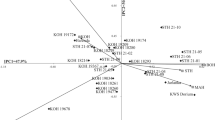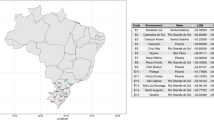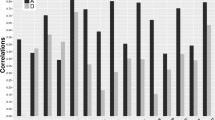Key message
We propose new methods to predict genotype × environment interaction by selecting relevant environmental covariates and using an AMMI decomposition of the interaction.
Abstract
Farmers are asked to produce more efficiently and to reduce their inputs in the context of climate change. They have to face more and more limiting factors that can combine in numerous stress scenarios. One solution to this challenge is to develop varieties adapted to specific environmental stress scenarios. For this, plant breeders can use genomic predictions coupled with environmental characterization to identify promising combinations of genes in relation to stress covariates. One way to do it is to take into account the genetic similarity between varieties and the similarity between environments within a mixed model framework. Molecular markers and environmental covariates (EC) can be used to estimate relevant covariance matrices. In the present study, based on a multi-environment trial of 220 European elite winter bread wheat (Triticum aestivum L.) varieties phenotyped in 42 environments, we compared reference regression models potentially including ECs, and proposed alternative models to increase prediction accuracy. We showed that selecting a subset of ECs, and estimating covariance matrices using an AMMI decomposition to benefit from the information brought by the phenotypic records of the training set are promising approaches to better predict genotype-by-environment interactions (G × E). We found that using a different kinship for the main genetic effect and the G × E effect increased prediction accuracy. Our study also demonstrates that integrative stress indexes simulated by crop growth models are more efficient to capture G × E than climatic covariates.



Similar content being viewed by others
References
Asseng S, Martre P, Maiorano A et al (2019) Climate change impact and adaptation for wheat protein. Global Change Biol 25:155–173
Brancourt-Hulmel M (1999) Crop diagnosis and probe genotypes for interpreting genotype environment interaction in winter wheat trials. Theor Appl Genet 99:1018–1030. https://doi.org/10.1007/s001220051410
Brancourt-Hulmel M, Denis JB, Lecomte C (2000) Determining environmental covariates which explain genotype environment interaction in winter wheat through probe genotypes and biadditive factorial regression. Theor Appl Genet 100:285–298. https://doi.org/10.1007/s001220050038
Brisson N, Gate P, Gouache D et al (2010) Why are wheat yields stagnating in Europe? A comprehensive data analysis for France. Field Crops Res 119:201–212. https://doi.org/10.1016/j.fcr.2010.07.012
Burgueño J, de los Campos G, Weigel K, Crossa J, (2012) Genomic prediction of breeding values when modeling genotype × environment interaction using pedigree and dense molecular markers. Crop Sci 52:707. https://doi.org/10.2135/cropsci2011.06.0299
Chenu K (2015) Characterizing the crop environment: nature, significance and applications. Academic Press Ltd., London
Chenu K, Cooper M, Hammer GL, Mathews KL, Dreccer MF, Chapman SC (2011) Environment characterization as an aid to wheat improvement: interpreting genotype–environment interactions by modelling water-deficit patterns in North-Eastern Australia. J Exp Bot 62:1743–1755
Crossa J, de los Campos G, Maccaferri M, et al (2016) Extending the marker × environment interaction model for genomic-enabled prediction and genome-wide association analysis in durum wheat. Crop Sci 56:2193. https://doi.org/10.2135/cropsci2015.04.0260
Cullis BR, Smith AB, Coombes NE (2006) On the design of early generation variety trials with correlated data. J Agric Biol Environ Stat 11:381–393. https://doi.org/10.1198/108571106X154443
Denis JB (1980) Analyse de la régression factorielle. Biom Praxim 20:1–34
IPCC Fifth Assessment Report. Climate change 2013: The physical science basis.
Gilmour AR, Gogel B, Cullis BR, Thompson R (2009) ASREML user guide release 3.0. VSN International, Hemel Hempstead
He J, Le Gouis J, Stratonovitch P et al (2012) Simulation of environmental and genotypic variations of final leaf number and anthesis date for wheat. Eur J Agron 42:22–33
Heslot N, Akdemir D, Sorrells ME, Jannink J-L (2014) Integrating environmental covariates and crop modeling into the genomic selection framework to predict genotype by environment interactions. Theor Appl Genet 127:463–480. https://doi.org/10.1007/s00122-013-2231-5
Jamieson PD, Semenov MA, Brooking IR, Francis GS (1998) Sirius: a mechanistic model of wheat response to environmental variation. Eur J Agron 8:161–179. https://doi.org/10.1016/S1161-0301(98)00020-3
Jarquín D, Crossa J, Lacaze X et al (2014) A reaction norm model for genomic selection using high-dimensional genomic and environmental data. Theor Appl Genet 127:595–607. https://doi.org/10.1007/s00122-013-2243-1
Justes E, Mary B, Meynard J et al (1994) Determination of a critical nitrogen dilution curve for winter-wheat crops. Ann Bot 74:397–407. https://doi.org/10.1006/anbo.1994.1133
Lecomte C (2005) Experimental evaluation of varietal innovations. Proposition of genotype—environment analysis tools adapted to the diversity of needs and constraints of the professionals of the seeds industry. Diss AgroParisTech, p 262
Lopez-Cruz M, Crossa J, Bonnett D, et al (2015) Increased prediction accuracy in wheat breeding trials using a marker × environment interaction genomic selection model. G3 Genes Genomes Genet 5:569–582.https://doi.org/10.1534/g3.114.016097
Ly D, Chenu K, Gauffreteau A et al (2017) Nitrogen nutrition index predicted by a crop model improves the genomic prediction of grain number for a bread wheat core collection. Field Crops Res 214:331–340. https://doi.org/10.1016/j.fcr.2017.09.024
Ly D, Huet S, Gauffreteau A et al (2018) Whole-genome prediction of reaction norms to environmental stress in bread wheat (Triticum aestivum L.) by genomic random regression. Field Crops Res 216:32–41. https://doi.org/10.1016/j.fcr.2017.08.020
Malosetti M, Bustos-Korts D, Boer MP, van Eeuwijk FA (2016) Predicting responses in multiple environments: issues in relation to genotype × environment interactions. Crop Sci 56:2210. https://doi.org/10.2135/cropsci2015.05.0311
Martre P, Dambreville A (2018) A model of leaf coordination to scale-up leaf expansion from the organ to the canopy. Plant Physiol 176:704–716
Martre P, Jamieson PD, Semenov MA et al (2006) Modelling protein content and composition in relation to crop nitrogen dynamics for wheat. Eur J Agron 25:138–154. https://doi.org/10.1016/j.eja.2006.04.007
Meuwissen THE, Hayes BJ, Goddard ME (2001) Prediction of total genetic value using genome-wide dense marker maps. Genetics 157:1819–1829
Millet EJ, Welcker C, Kruijer W et al (2016) Genome-wide analysis of yield in Europe: allelic effects vary with drought and heat scenarios. Plant Physiol 172(2):749–764
Parent B, Leclere M, Lacube S, Semenov MA, Welcker C, Martre P, Tardieu F (2018) Maize yields over Europe may increase in spite of climate change, with an appropriate use of the genetic variability of flowering time. Proc Nat Acad Sci 115:10642–10647
Purcell S, Neale B, Todd-Brown K et al (2007) PLINK: a tool set for whole-genome association and population-based linkage analyses. Am J Hum Genet 81:559–575. https://doi.org/10.1086/519795
Rimbert H, Darrier B, Navarro J et al (2018) High throughput SNP discovery and genotyping in hexaploid wheat. PLoS ONE 13:e0186329. https://doi.org/10.1371/journal.pone.0186329
Rincent R, Kuhn E, Monod H et al (2017) Optimization of multi-environment trials for genomic selection based on crop models. Theor Appl Genet 130:1735–1752. https://doi.org/10.1007/s00122-017-2922-4
Rincent R, Charpentier JP, Faivre-Rampant P, Paux E, Le Gouis J, Bastien C, Segura V (2018) Phenomic selection is a low-cost and high-throughput method based on indirect predictions: proof of concept on wheat and poplar. G3 Genes Genomes Genet 8:3961–3972. https://doi.org/10.1534/g3.118.200760
Rodrigues PC, Malosetti M, Gauch HG, van Eeuwijk FA (2014) A weighted AMMI algorithm to study genotype-by-environment interaction and QTL-by-environment interaction. Crop Sci 54:1555–1570
Schulz-Streeck T, Ogutu JO, Gordillo A et al (2013) Genomic selection allowing for marker-by-environment interaction. Plant Breed 132:532–538. https://doi.org/10.1111/pbr.12105
Smith AB, Cullis BR, Gilmour AR (2001) The analysis of crop variety evaluation data in Australia. Aust N Z J Stat 43:129–1450
Tardieu F (2012) Any trait or trait-related allele can confer drought tolerance: just design the right drought scenario. J Exp Bot 63:25–31
Touzy G, Rincent R, Bogard M et al. (2019) Using environmental clustering to identify specific drought tolerance QTLs in bread wheat (T. aestivum L). Theor Appl Genet. https://doi.org/10.1007/s00122-019-03393-2
Usai MG, Goddard ME, Hayes BJ (2009) LASSO with cross-validation for genomic selection. Genet Res 91:427. https://doi.org/10.1017/S0016672309990334
VanRaden PM (2008) Efficient methods to compute genomic predictions. J Dairy Sci 91:4414–4423. https://doi.org/10.3168/jds.2007-0980
Ward JH Jr (1963) Hierarchical grouping to optimize an objective function. J Am Stat Assoc 58:236–244
Xose Rodriguez-Alvarez M, Boer MP, van Eeuwijk FA, Eilers PHC (2018) Correcting for spatial heterogeneity in plant breeding experiments with P-splines. Spat Stat 23:52–71. https://doi.org/10.1016/j.spasta.2017.10.003
Zadoks JC, Chang TT (1974) Konzak CF (1974) A decimal code for the growth stages of cereals. Weed Res 14:415–421
Acknowledgements
Management of the wheat multi-environment trials was financially supported by the French National Research National Agency under Investment for the Future (BreedWheat Project ANR-10-BTBR-03) and by FranceAgriMer. The Phéno3C platform was financially funded by the French National Research National Agency under the Investment for the Future Phenome project (ANR-11-INBS-12) and by the European Regional Development Fund (AV0011535). This publication has been written with the support of the AgreenSkills + fellowship programme which has received funding from the EU’s Seventh Framework Programme under Grant Agreement No. FP7- 609398 (AgreenSkills + contract). PM was also supported by the EU project H2020 SolACE (Grant Agreement No. 727247).
Author information
Authors and Affiliations
Corresponding author
Ethics declarations
Conflict of interest
The authors declare that they have no conflict of interest.
Ethical standards
The authors declare that the experiments comply with the current laws of the countries in which the experiments were performed.
Additional information
Communicated by Mikko J. Sillanpaa.
Publisher's Note
Springer Nature remains neutral with regard to jurisdictional claims in published maps and institutional affiliations.
Electronic supplementary material
Below is the link to the electronic supplementary material.
Rights and permissions
About this article
Cite this article
Rincent, R., Malosetti, M., Ababaei, B. et al. Using crop growth model stress covariates and AMMI decomposition to better predict genotype-by-environment interactions. Theor Appl Genet 132, 3399–3411 (2019). https://doi.org/10.1007/s00122-019-03432-y
Received:
Accepted:
Published:
Issue Date:
DOI: https://doi.org/10.1007/s00122-019-03432-y




